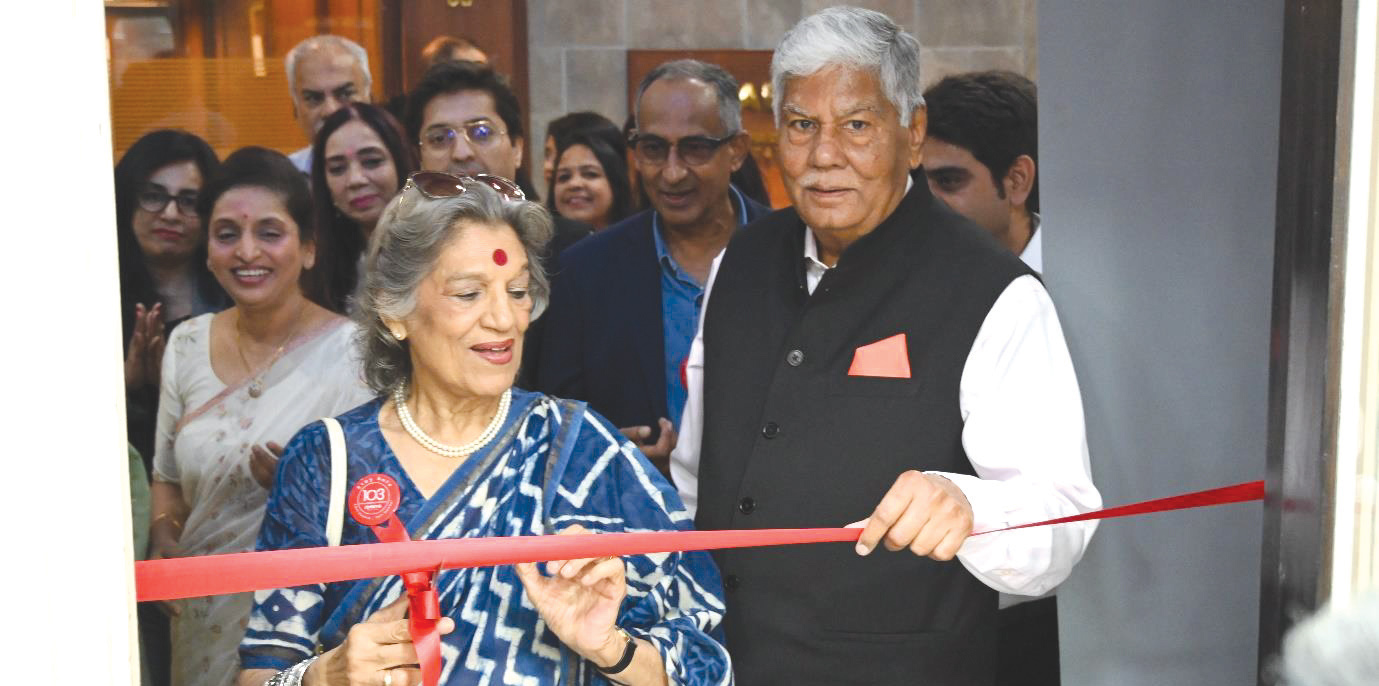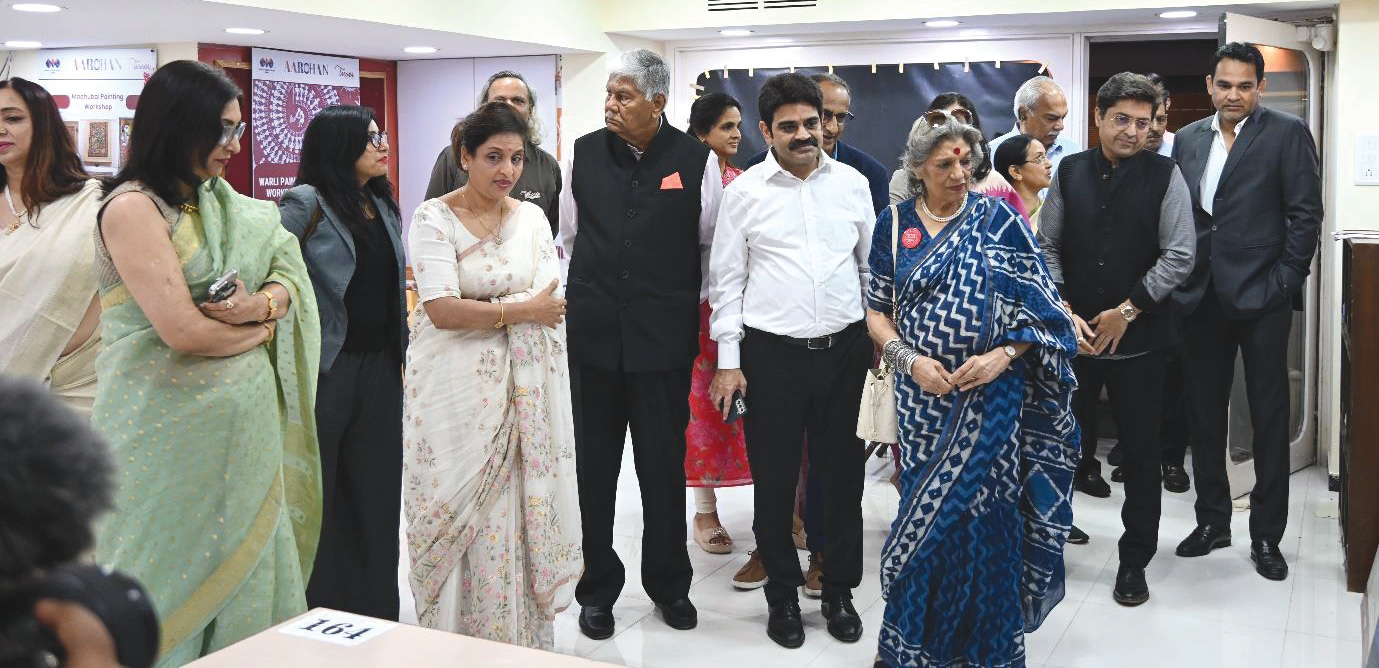World Trade Center (WTC) Mumbai, All India Association of Industries (AIAI) and Tisser Artisans Trust jointly organized MahaCollab, a two-day event featuring Fireside chat, keynote address,
exhibition & fashion show to promote sustainability, circularity, and innovation. The event showcased sustainable design, community-driven innovation, and social impact, emphasizing the role of
artisans in shaping a sustainable future.
A key highlight of the event was the inauguration of the Aarohan Skill Center to impart vocational skills and create livelihood and entrepreneurship opportunities for women artisans.
Ms. Dolly Thakore, a veteran Indian theatre actress and casting director graced the inauguration ceremony.
Speaking on this occasion, Ms. Roop Rashi Mahapatra, IA&AS, Commissioner, Ministry of Textiles, Government of India said, “The Office of the Textile Commissioner along with Tisser Artisans
Trust has partnered with Navi Mumbai Municipal Corporation to develop a textile resource recycling model which can be replicable by other municipal corporations in the country. Under this initiative,
the Office of the Textile Commissioner will develop in-loop and out-of-loop circularity practices for bringing discarded textiles and garments back into production process. We will include traceability
to track textile product across its life cycle right from fibre to garment and the point of consumption.”
During his keynote address, Dr. Vijay Kalantri, Chairman, World Trade Center Mumbai and President, All India Association of Industries highlighted the unique textile expertise of each country.
He stated, "Every country has its own specialty in textiles. For instance, India and Egypt are renowned for cotton, while Switzerland is known for its high-quality textiles. This diversity creates
opportunities for cross-border collaboration through the exchange of best practices and the expansion of trade."
He further emphasized the significance of the event as a valuable platform for artisans, stating, "Artisans produce remarkable work; they only need the right support. This event serves as an
important avenue for their growth. I assure the full support of the World Trade Center Mumbai and the All India Association of Industries for such initiatives."
Dr. Megha Phansalkar, Founder of Tisser Artisans Trust, elaborated on the organization’s commitment to livelihood generation, sustainability, and creativity. She said, “At Tisser, our mission
is to empower artisan clusters by building sustainable producer enterprises. We have undertaken various initiatives, such as collaborations with universities to foster awareness, organizing
carnivals to promote local brands—especially those led by women—and now launching the Aarohan Skill Center. These efforts strengthen the handmade value chain through innovative practices and a
transformative business model that fosters long-term growth and resilience.”
The event also featured a panel discussion showcasing global best practices in circularity and women’s empowerment.
Emphasizing the significance of the textile industry in India’s economy, Ms. Roop Rashi Mahapatra noted, “India has a strong presence in the global textile sector, particularly in cotton, where we are
the largest producer. We are also the second-largest contributor in silk, jute, and man-made fibers. The textile industry has the longest value chain and employs approximately 100 million people, directly and indirectly.
Given the resource-intensive nature of this sector, sustainability must be embedded in its value chain. Traditionally, the textile industry does not create waste—it treats waste as a resource.
However, post-consumer textiles must be systematically collected and reintegrated into fiber cycles.”
Mr. Adolfo Garcia Estrada, Consul General of Mexico said, “World artisans, especially women, drive economies. But their ability has been constrained due to various challenges such as low production volumes and
limited market access. However, artisanship is inherently circular. India’s traditional repurposing of textiles is a prime example. Mexico is also making strides in this area. With 2025 declared as the Year of
Indigenous Women in Mexico, the government has launched several initiatives to support women artisans. Circularity and artisanship must be viewed as part of a shared global vision.”
Talking about circularity initiatives in Switzerland, Mr. Martin Maier, Dean of Consuls and Consul General of Switzerland said, “In Switzerland, circularity in recycling was cultivated through a mix of
incentives and regulations. The government made it expensive to produce waste—for example, special garbage disposal bags cost around USD 5, discouraging excessive waste generation. At the same time, we
introduced convenient collection facilities to encourage recycling. What started as a cost-reduction strategy has now evolved into an ingrained national practice.”
Ms. Katerina Vovkova, Consul General of Czech Republic highlighted her country’s efforts in textile circularity. She said, “The Czech Republic has been a leader in textiles for the past eight decades and has
long collaborated with India in this sector. While we only recently launched our circularity initiatives in 2021, we have set ambitious goals—to achieve complete circularity by 2040 through structured five-year plans.
We are already witnessing the rise of startups in this space. With clear policy direction and progressive thinking, we can achieve true circularity.”
Speaking about Sri Lanka’s sustainability initiatives, Ms. Shirani Ariyarathne, Consul General of Sri Lanka said, “In 2025, the Sri Lankan government launched the Clean Sri Lanka Project to tackle excessive
waste production and improper disposal, allocating 5 billion Sri Lankan Rupees for this initiative. A key mantra for reducing waste is to buy better and buy less. If more people adopt these principles,
we can transition from micro-level efforts to macro-level impact at the national and even global scale.”
Talking about the cordial relations between both the nations, she added, “The FTA between India and Sri Lanka has enhanced cooperation between both the nations in textile sector as textiles and garments
benefit through various duty concessions under the agreement. I believe that this event will set the stage for further areas of cooperation between both nations especially in sustainability and circularity.”



 : +91 7718886506
: +91 7718886506